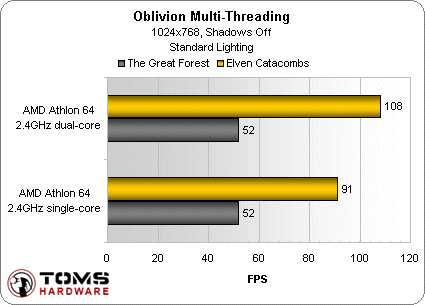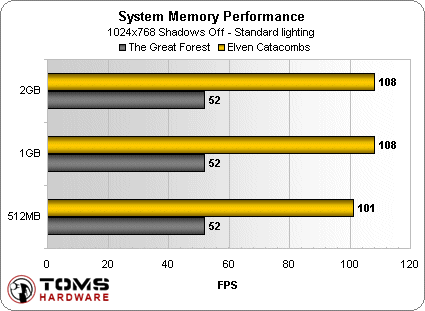Can Your Rig Run Oblivion?
Oblivion Multi-Threading: Single Versus Dual-Core Performance
Oblivion boasts some of the most advanced 3D rendering technology currently available for the PC. However, in software threading terms it remains a rather old school title. Granted, the engine does make use of some multi-threading, but the benefit of adding a second CPU core is nothing like as dramatic as the 80 to 80 percent performance scaling seen with the recent Quake 4 beta patch. The maximum performance benefit of a dual-core processor is around 20 percent. And as our benchmark results demonstrate, a dual-core chip won't give your frame rates a boost where you need it most - out in the Great Forest.
System Memory Performance Scaling
Take a peek at our benchmark results and you could be forgiven for thinking that system memory availability has no impact on Oblivion performance. But this is one test where the benchmark figures don't tell the whole story. For starters, level loading times with anything less than 1 GB or RAM are painfully slow - perhaps three to four times longer with 512 MB than 1 GB and above!
Once you are in game, performance only remains unaffected by RAM availability if you restrict your movements to a relatively small area as we did for our benchmark tests. If you choose to explore further, you'll suffer frequent stuttering and disk thrashing as the game engine attempts to seamlessly load and discard scenery. We wish to stress this once more, 1 GB is the minimum to allow the engine to achieve smooth transitions.
Get Tom's Hardware's best news and in-depth reviews, straight to your inbox.
Current page: Oblivion Multi-Threading: Single Versus Dual-Core Performance
Prev Page Golden Oldies: ATI Radeon X850 XT PE And Nvidia GeForce 6800 Ultra Next Page Pixel Shading Performance: ATI's R520 Vs R580
